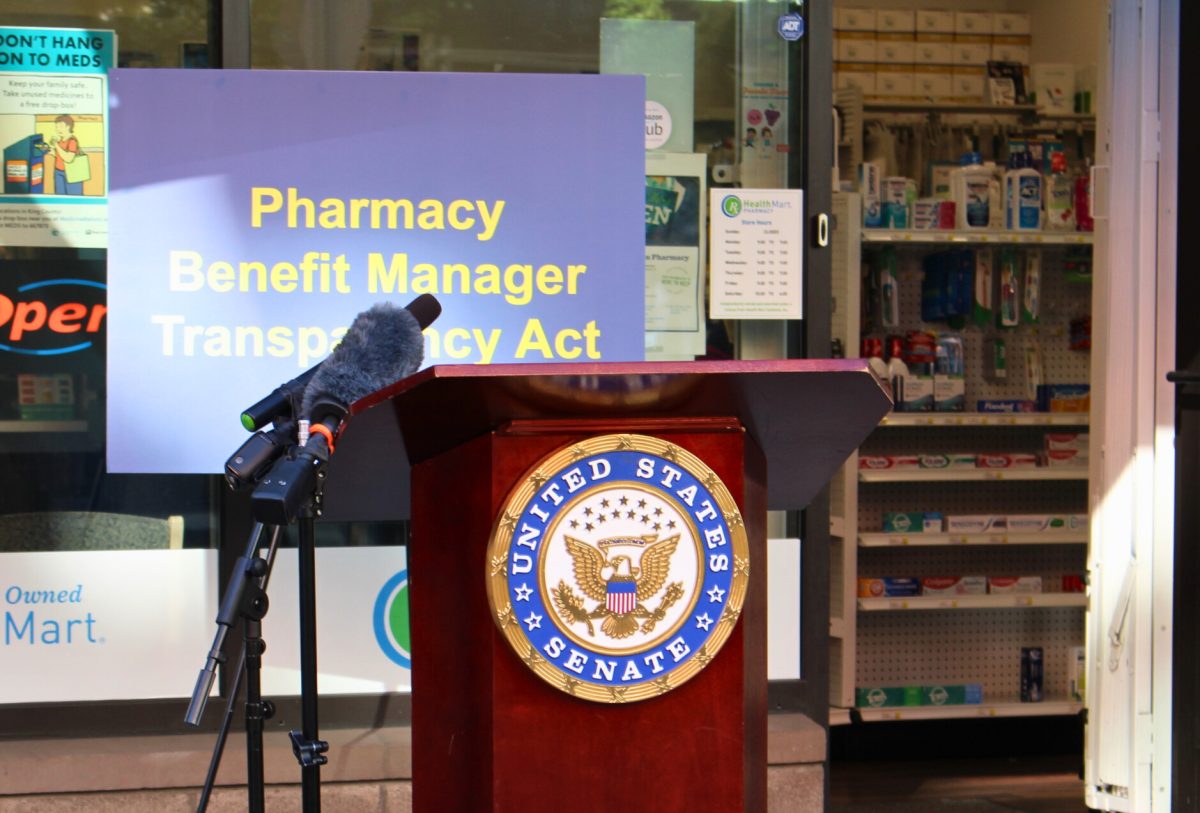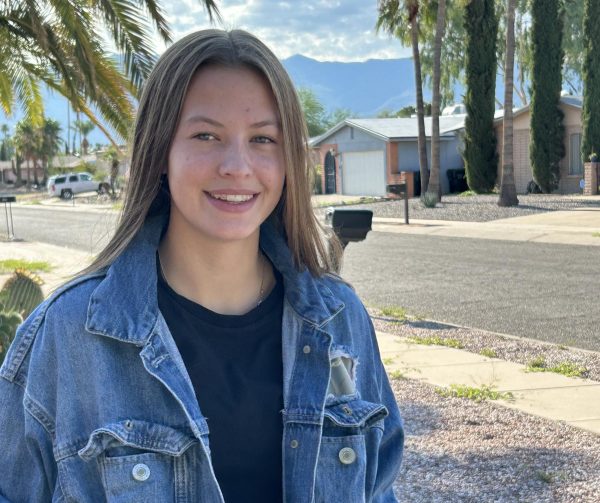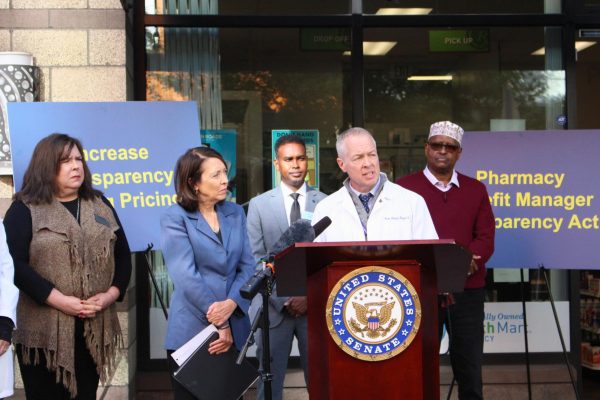
Independent pharmacies play a vital role in many communities. They not only distribute medications but also provide vaccinations, give information about prescriptions, and much more. Senator Maria Cantwell (Democratic – WA) is working with Senator Chuck Grassley (Republican – IA) to continue America’s privilege of in-person meetings with pharmacists and independent pharmacies, which unbeknownst to many people, is under attack.
“This is a critically important piece of legislation that will help protect patients, communities, and the pharmacies that serve them by shedding light on the PBM business practices that are responsible for driving up the cost of drugs while closing community pharmacies,” said Ryan Oftebro, CEO of Kelly Ross Pharmacy Group and Clinical Professor at the University of Washington’s School of Pharmacy.
The Pharmacy Benefit Manager Transparency Act is one way to save pharmacists and independent pharmacies. This bill will give, “…the power to the FDC to make sure that deceptive and unfair practices that are being used by pharmacy benefit managers, such as spread pricing and clawbacks, do not cause pharmacies to close and create a transparency in actual drug pricing.”
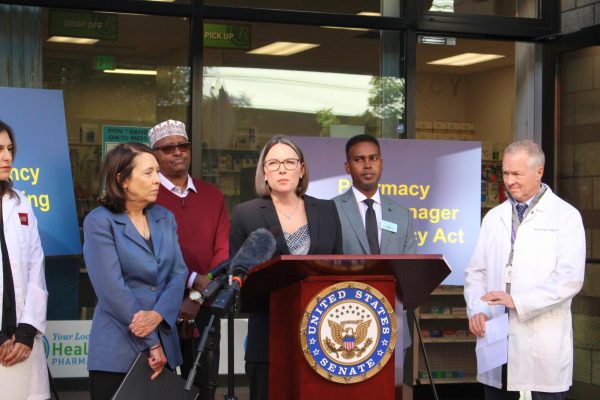
Jenny Arnold, the CEO of the Washington State Pharmacy Association spoke at a press conference on September 12th in front of Othello Station Pharmacy, founded by Doctor Ahmed Ali and Doctor Abdirahman. “Pharmacy benefit managers, the little-known middlemen, are now controlling healthcare completely under the radar. These entities decide which medications patients receive, where they receive them, and what they pay for their medications. Unlike other insurance companies, pharmacy benefit managers are unregulated; they act in the best interest of their stakeholders, not in the best interest of their patients,” Jenny said.
Jenny continued to share the original importance of pharmacy benefit managers – they were first implemented to increase the use of generic medications in an effort to save money and build the pharmacy industry. Now, pharmacy benefit managers (PBMs) are doing the opposite in order to make more money for themselves, leading to the closure of independent pharmacies, and consolidating the pharmaceutical business into the control of three major powers: CVS Caremark, Express Scripts, and Optum/United Healthcare – currently, these three control 80% of the market.
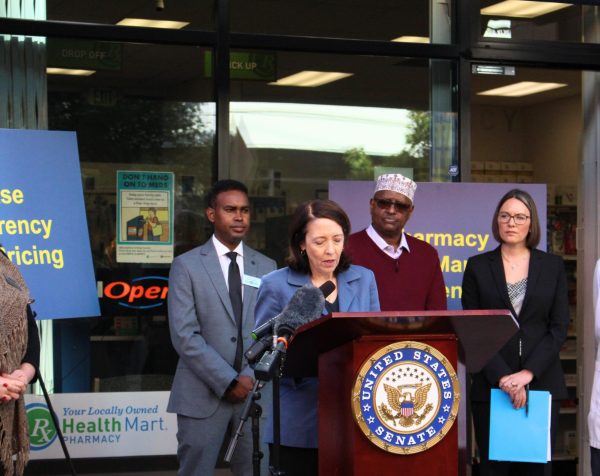
The consequences of not passing the PBM Transparency Act would be known and felt around the country. Following the press conference, Senator Cantwell said in an interview, “We’ll see more pharmacies shut down…I think everyone in America gets it, when you go to the pharmacy…you ask the pharmacists, ‘Well wait what can I do here? Can I take this? Can I not take this? When can I take this?’ It’s kind of like the whole little interaction, the final delivery step, is there with this pharmacist. Now if they go away, you’re not going to have that. And I do think there’s some pretty big powers that like to just have no competition – control the whole distribution of drugs, and I think the pharmacists play a vital role.”
According to the Arizona State Senate, Arizona law now allows pharmacists to file formal complaints to the Director of the Department of Financial Institutions, then requires that the director investigate the complaint, and then hold the pharmacy benefit manager accountable. These complaints are around violations of, “…charging a fee related to the claims adjudication process.” In non-lawyer talk, according to Experian, this means, “Claims adjudication is the process by which insurance companies review healthcare claims and decide whether they will pay the claim in full, pay a partial amount, or deny the claim altogether.”
So what can PBMs still do in Arizona? PBMs can still have clawbacks, meaning they will require the pharmacies to return money to them, sometimes with fees. They can still have spread pricing, which means the PBM charges more to a healthcare plan than it pays to a pharmacy. This means that while the costumers are having to pay more, the pharmacies are getting paid less.
So, why are spread pricing and clawbacks, tactics used by PBMs to control the market to their benefit so harmful to pharmacists and patients? “…they basically are a concentration of the market without people having options to go to other places. They basically are saying that this is the price of the drug, but then charging or clawback the discounts that pharmacies have. Oftentimes without reason or explanation,” explained Senator Cantwell.
Even though Sahuaro’s pharmacy tech teacher, Ms. Kyles said her position as a teacher would not change, she feels that, “Now, patient interaction, that would affect a lot, only because you wouldn’t see patients a lot, so I think it would more so affect the patients more so than the career…a lot of patients feel more comfortable to talk face-to-face with the pharmacists and ask questions…”
In Ms. Kyles’ opinion of the current state of Arizona’s pharmacy industry, “A lot of issues are now that certain medications that people really need are not being covered by insurance, and I don’t necessarily think that’s a pharmacy issue, I think that’s an insurance issue – pricing, different stuff like that.” However, she also says that she hopes the bill will help “…some people have life-saving medication that they can’t afford and I think that should never be the case.”
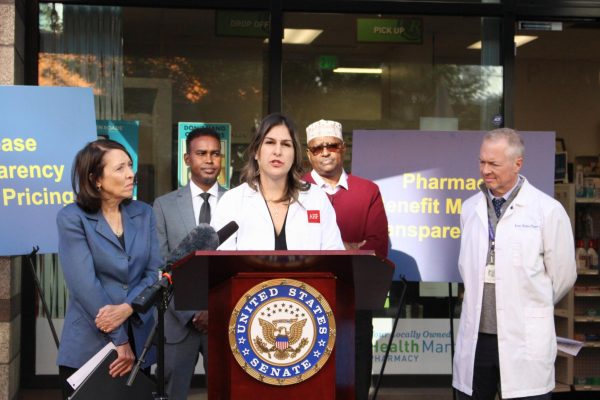
One job of the pharmacist, especially in independent pharmacies is to build relationships and reputations among their patients. For those struggling with AIDS, pharmacists are an essential portion of their care. Another speaker at the press conference, Roshanak Mohaghegh, Regional Director of Pharmacy of the AIDS Healthcare Foundation, said, “The key to successful HIV care is having an integrated care model, and the pharmacist is the essential component of that model. The pharmacist often is the person most closely in touch with the patient and trusted by the patient to provide confidential support. PBMs smash that model of care. They force patients into mail order, breaking their tie with their pharmacist.”
After working in the field of pharmacy for ten years – working as a compound pharmacist and pharmacy teacher – Ms. Kyles refuses to work in retail pharmacy. This is because “…it’s a little more tight-knit. They’re a little more personal with their customers, whereas corporate is like ‘This is the rules, and everyone needs to fit in these rules and that’s it.'”
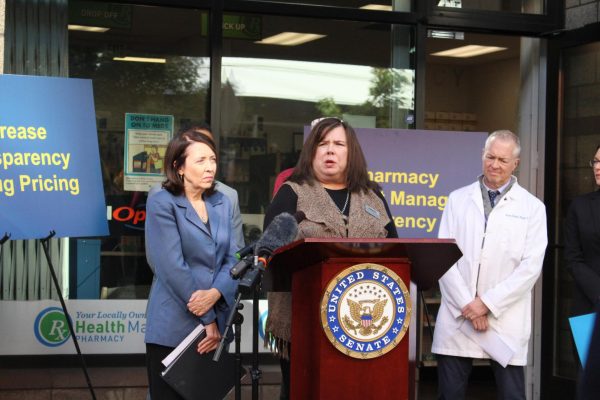
With a rise in drug pricing, patients are finding it hard to pay for their prescriptions. Some have medications that are life and death. They will die if they don’t take them. With no choice, some are forced to give up other necessities. Cathy MacCaul, the Advocacy Director for AARP Washington State, said, “…I’m speaking on behalf of nearly fifty million other older adults across this country that prescription drug pricing is a challenge for them. We hear countless stories of older adults who make terrible decisions around…not paying for food and utilities in order to pay for their high cost of prescription drugs.” These decisions are not their fault. For some, this choice is between life (medication) and death (food and utilities).
Cathy went on to say that America pays the most money for prescription medication in the world – this is all because pharmacy benefit managers control prices for their own good instead of the good of the people they “serve”. They are no longer working for other people. They are working for themselves.
Senator Cantwell gave the stats, “…since January 2022, the price of about 3,000 drugs shot up an average of $150 per dose. Just six months later, another six hundred drugs went up, this time an average of $250 dollars. Incredibly, the price of two cancer-fighting drugs soared $25,000 dollars for a single injection. What is someone supposed to do when the drugs they depend on, for their life, shoot up by hundreds of dollars with no warning?” From what Cathy MacCaul said, we can see exactly what people will do when they can’t afford their life-saving medications – they will be forced to give up other necessities.
This isn’t just happening in Washington pharmacies. Senator Cantwell said, “That’s what we’re hearing from pharmacies all over America. If we allow the PBMs to continue to keep this practice up, they are going to, literally, create a desert of pharmacies in areas of the United States that we cannot afford to have.”










